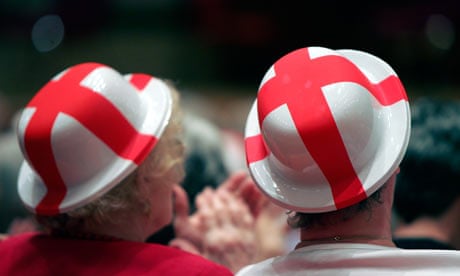How do the people living in the United Kingdom define themselves? How many of Scotland's residents count themselves at British, and how does that compare to England?
The Guardian is asking its readers about their national identity in a new project launching today, but as the Guardian's Scotland correspondent Severin Carrell found, it's not the only effort to gauge the UK's national character:
Comparing all the latest social attitudes surveys gives us this contrast: if voters are forced to choose, 52% of English voters choose British first compared to 19% of Scots, and 30% of Welsh.In coming days we will look at how these identities are evolving and what the political impact of that may be.
Intriguingly, the latest evidence from Wales suggests that devolution may be making the Welsh feel more British. That is one reading of a new study funded by the Economic and Social Research Council of 3029 voters, carried out in the run-up to the 2011 referendum which saw overwhelming support for giving the Welsh assembly greater powers.
Its results, published here for the first time, find that 16% of Welsh voters now feel "British not Welsh" compared to 9% in 2007 and in 2003. Meanwhile, only 19% felt "Welsh not British" a fall from 24% in 2007, with 30% feeling equally "Welsh and British".
Identity is a subject researchers often investigate‚ but the answer often depends on who's doing the asking, and how. The simplest way to frame the question is to force respondents to pick just one identity: Scottish, English, Welsh (as appropriate) versus British.
Asked this way, only the English generally define themselves as British, except during a one year aberration in 2007.
By contrast, three times as many Scots define themselves as Scottish rather than British:
Wales is asked about its national identity far less often than Scotland or England (and Northern Ireland less than any of the others) – but is closer to England on the few occasions it's asked about its identity with a free choice, a polling technique which allows respondents to pick as many national identities as they like: Scottish, British, or both.
Northern Ireland isn't included in either of the above datasets, which were compiled from Social Attitudes Surveys and information gathered prior to devolution referenda in Scotland and Wales.
Northern Ireland is generally asked about its identity in different terms: whether its populace feels closer to England and the English, or Ireland and the Irish. The Northern Ireland Life and Times survey (http://www.ark.ac.uk/sol/surveys/community_relations/time_series/CRencyidentity.htm) is the most comprehensive collector of such data.
The four constituent countries of the UK have been asked similar questions in the same year just once since 1997. In 2007, each was asked a so-called "Moreno" question: a survey question allowing respondents to define their national identity on a scale. Each Moreno question asked since 2007 is detailed below:
The data behind each chart can be downloaded using the link in each graphic. What strikes you as interesting? How much has national identity changed in the last decade?
More data
Data journalism and data visualisations from the Guardian
World government data
Search the world's government data with our gateway
Development and aid data
Search the world's global development data with our gateway
Can you do something with this data?
Flickr Please post your visualisations and mash-ups on our Flickr group
Contact us at data@guardian.co.uk

Comments (…)
Sign in or create your Guardian account to join the discussion